Transistor Message Board
↕
The Last of Us is coming to PS4, Transistor finally has a release date (next month!), and a new Borderlands game got announced — how much more could we have asked for this week, really?
A few more highlights: that fancy new slim PS Vita + Borderlands 2 bundle is out May 6th, Ryan went hands-on with MLB ’14 The Show (don’t miss our PS3 / PS4 stadium comparison, by the way), the Trials series makes its PlayStation debut on Tuesday, Naughty Dog is 30 (congrats guys!), our Worldwide Studios pals are rockin’ PAX East this weekend, voice-controlled squad-based SRPG There Came an Echo got announced for PS4, and inFAMOUS Second Son has sold over a million copies.
What are you playing?
- I’m playing: Dark Souls II, OlliOlli
- I’m watching: Seinfeld
- I’m listening to: The Cat Empire, Lifeformed, TLOU Soundtrack
This Week’s PlayStation Store Update

This Week’s PlayStation Plus Update

PlayStation Blogcast 116
Most-Watched Video of the Week

↕
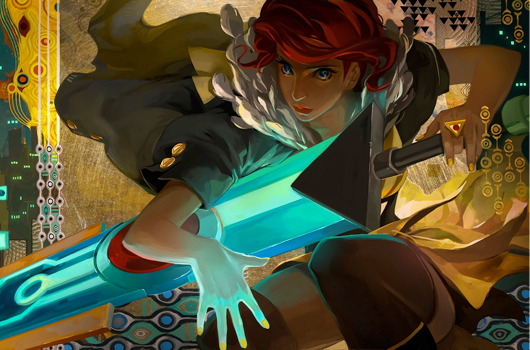

↕
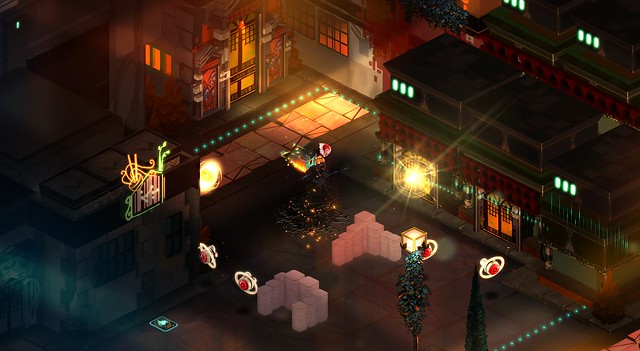
Transistor is coming soon! Mark your calendar for May 20th, 2014 — In just a few weeks, our next game will be available on PS4! We’ve been putting the finishing touches on it, and we think it’s just about ready.
If you’re not familiar with the game, Transistor is a sci-fi themed action RPG that invites you to wield an extraordinary weapon of unknown origin as you fight through a stunning futuristic city. Gameplay seamlessly integrates thoughtful strategic planning with fast-paced action and rich atmospheric storytelling. During the course of the adventure, you’ll piece together the Transistor’s mysteries as you pursue its former owners.

This week at PAX East in Boston, several of us from Supergiant will be taking a short break from development to show you some of our latest progress. We’ll have a near-final build of the game running on PS4, which you’ll be able to get your hands on at our booth (#892). It was one year ago at PAX East that we showed Transistor for the first time!
We’ll have more details about Transistor in the days leading up to our launch next month. Until then, here are some quick facts we wanted to share — stay tuned for more:
When is Transistor due out?
Transistor’s release date is May 20th, 2014.
Where will I be able to get the game?
You’ll be able to get Transistor for PS4 on PlayStation Store
How much is the game?
$19.99 in North America.
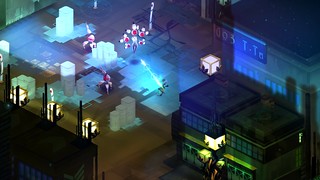
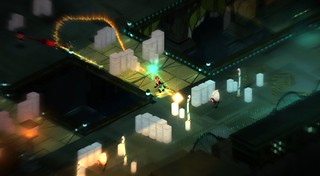
Will Transistor be available in my country?
We plan for a worldwide launch. Transistor includes English voiceover and text in English, French, Spanish, Italian, German, Russian, and Brazilian Portuguese.
Can I preorder the game?
Not at this time, though we’re looking into it!
I have more questions.
Sure! Read our Transistor FAQ, send questions to @SupergiantGames on Twitter, or leave us comments here on PlayStation.Blog.
Stay tuned for more news, and get ready to play Transistor in the near future!

↕
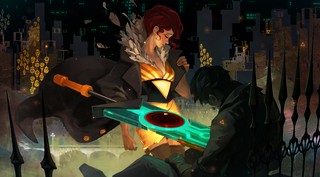
While being part of a small independent studio like Supergiant has its share of challenges, it’s got a lot of advantages going for it, too. For instance, one of the ironic differences I’ve experienced going from a very big game studio to a very small one is that things can often move a lot faster when there aren’t too many people around to say “no.”
This simple fact is core to our creative process at Supergiant. We like quickly coming up with, and trying, new ideas all through development. If you can loop through that kind of process quickly enough, it can start to produce great results, while the many inevitable failed experiments are easy to move on from, having taught you something. Let me tell you about one unexpected example from recent months, involving a little trick we decided to try on a whim with the DualShock 4, when we first got our hands on it.
The story of our game, Transistor, revolves around this woman called Red, who winds up with an extraordinary weapon that, among its mysteries, is able to speak to her. When we tested early versions of the game on our friends, everybody noticed the voice, but not everybody could tell where it was coming from or who exactly was speaking. This was an important problem for us to solve, as there’s a fine line between feeling intrigued by the mystery of a thing, versus feeling bewildered.

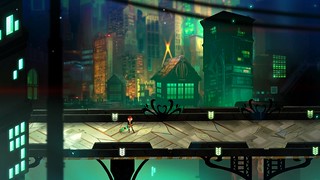
So we started trying different things. We iterated on the introductory moments a bunch of times, until we felt like we had a scene that set up the relationship between these characters as clearly and succinctly as possible. We also developed a cool bit of tech that makes the Transistor flash in sync with the voiceover coming from it.
This flashing effect not only helps our main character stand out amid the colorful futuristic scenery, but because of it you instantly infer that the voice you’re hearing must be coming from that weird computer sword Red’s carrying around. We finally felt like we’d solved the who’s-talking problem. Then we started playing with the PS4 controller, and we had another idea.
See, among its many features, the DualShock 4 has this light bar on it, which can be programmed to display just about any color. When Sony revealed the controller, they suggested this light bar could have a variety of uses, such as visually distinguishing between four players in a cooperative game and stuff like that. Sony didn’t suggest it could be used to indicate when an extraordinary weapon of unknown origin was speaking to you. We soon found, however, that the light bar works really well for that. We got it to match the exact turquoise hue of the in-game weapon, and the flashing effect was in perfect sync. When I played with this for the first time, it felt a little more like the Transistor was right there in my own hands.
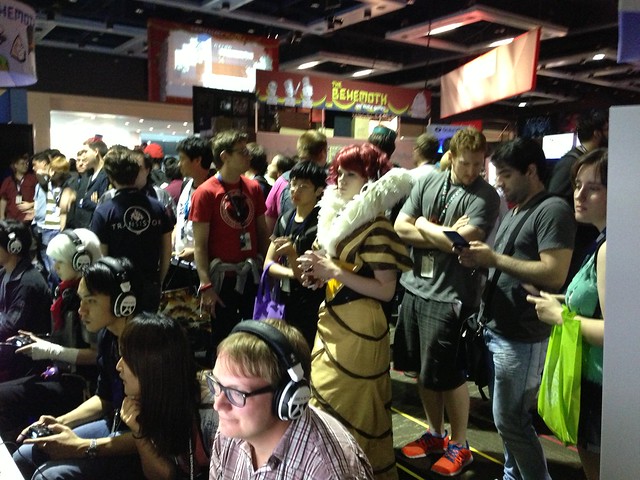
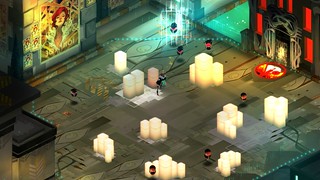

Nevertheless, it’s a subtle enough feature so we didn’t really play it up. We don’t like talking about our games in terms of specific features anyway, plus we wanted to see if anyone would even notice. And sure enough, when we showed Transistor at PAX Prime recently, dozens of people who played it mentioned to us that they caught that little detail, and how cool they thought it was.
Our use of the light bar took nothing more than a quick conversation and maybe a couple of hours of engineering time. But to me it’s a microcosm of our development process. If we can pull together little touches like this spontaneously and often, then Transistor will be filled with them. And I feel strongly that the small stuff in games — those fun and interesting little details you notice in your favorites — are just as important as the big stuff. It’s what gives the best games their distinctive character and personality, and it’s the stuff you end up remembering long after you’ve finished playing.
When you see a game like Transistor, know that it’s not the product of some grand vision or massive design document, where we mapped out every detail on paper and then spent the rest of the time building from a meticulous blueprint. It’s a much more fluid and intuitive process, a feedback loop of listening to the game and responding to what we think it needs over a long period of time, where a hundred thousand micro decisions eventually form the finished work. I love that we found opportunities to apply our process even to things like a light bar on a controller.
You know what? The controller has a speaker on it, too. We’re looking into that.
Feel free to check up on us at any time at @SupergiantGames on Twitter. Transistor is scheduled to hit PS4 early next year.

↕

Being a voice trapped in an inert object makes the relationship between player and narrator "symbiotic," according to a report from Polygon. The narrator in Transistor isn't an omniscient storyteller; he has feelings, and exists in the present, alongside Red.
"I hope that what comes across is he really cares about Red the protagonist," creative director Greg Kasavin said. "If you get nothing else out of it, I hope you get that - that he cares about what happens to her and he doesn't want her to come to harm."
Of course, being a sword, the Transistor is dang good at making sure Red is protected.

↕
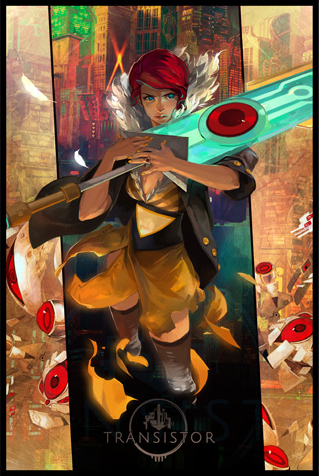
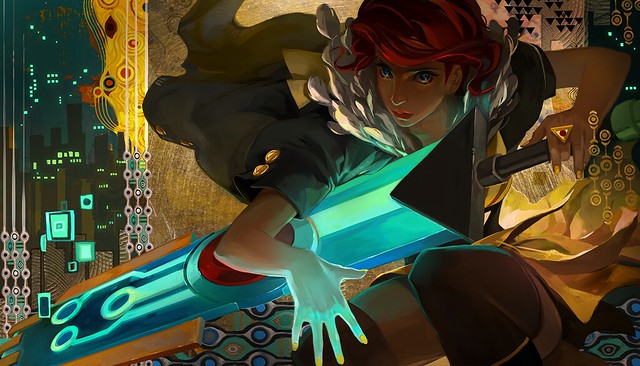
One of the most striking trailers to come out of E3 this year was that of Transistor, Supergiant‘s upcoming PS4 action RPG. After watching it a few hundred times, I made it my personal mission to go hands-on with it at this year’s PAX Prime — and after waiting in one of the longest lines at the show, I did just that.

Transistor adopts a top-down, isometric view during gameplay, not unlike Supergiant’s previous title, Bastion. The overall art style is similar as well, with vibrant colors just aching to burst through the screen. Transistor takes on a more modern aesthetic, though, with a neo-watercolor tone permeating the scenery we’ve been shown so far. This style really shines — both in cutscenes encountered in-game, and in real-world prints that you can get from Supergiant’s website (like the one to the right).
A moody, melodic score complements Supergiant’s luscious visuals — I’m looping the E3 trailer nonstop as I’m writing this — seamlessly weaving between exploration, combat sequences, and cutscenes, and highlighted by Ashley Barrett‘s mesmerizing vocals. In case you’re as entranced as I am, Supergiant has confirmed that a soundtrack for Transistor will be made available at launch, or shortly thereafter.
Combat in Transistor initially plays like a standard action RPG: attack enemies to gain experience points and level up your character. Things get interesting, though, when the “Turn” system is introduced. At any point during a battle, you can pull the R2 trigger to stop time around Red, Transistor’s protagonist. While her foes are frozen, Red can reposition herself and plan a series of attacks, all of which will be executed in quick succession when you press R2 again.
Each movement and attack depletes a meter at the top of the screen, so you need to think your assault through carefully — wiping out a field of monsters (The Process, as they’re called here) in one meticulously-planned onslaught is intensely satisfying. After time resumes and your attack is finished, your Turn meter takes a few seconds to recharge, leaving you vulnerable while your enemies seek to retaliate. This prevents battles from becoming too one-sided, which is quite a feat in a game where you can freeze time.
Four attacks were available in the demo I played: Crash, a standard, close-range attack; Breach, which is especially effective for enemies lined up in front of Red; Jaunt, a quick dash that will get her out of harm’s way quickly; and Spark, a cluster of bombs that will make short work of a crowd of smaller enemies. Mix these different attacks up after activating a Turn, and The Process will know not to mess with Red.
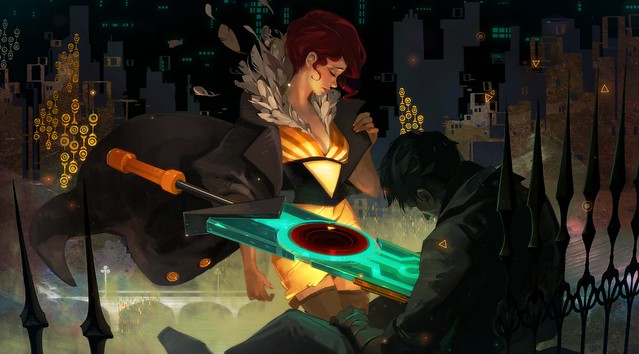
Transistor’s story is driven forward by dynamic narration, provided by the titular blue sword Red carries. As the Transistor speaks, a blue light pulses from its more transparent areas, matching the metre and accents of its speech. In my favorite use of DualShock 4′s new technology so far, the light bar on the controller matches the pulsing light on screen. It’s a small addition that some might not even notice, but it’s clever touches like this that have earned Supergiant my confidence.
Supergiant says we can expect Transistor in early 2014. Until then, I’m going to go watch that E3 trailer another hundred times.

↕
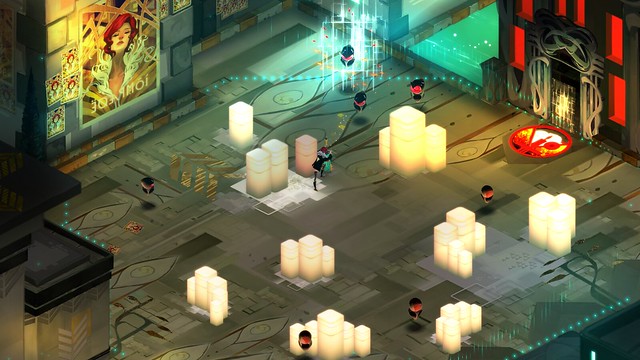
One of the stand-out moment at this year’s PlayStation press briefing at E3, for me at least, was when eight independent developers took to the stage to show off their PS4 titles. As Adam Boyes explained here on PlayStation Blog following the show, indie games are a key part of what makes PS4 such a special platform, and it was a landmark moment seeing these fantastic teams sharing the limelight with AAA titles such as Assassin’s Creed IV and Final Fantasy XV.

Leading them out were Greg Kasavin and Amir Rao of Supergiant Games, who announced that Transistor, their bewitchingly beautiful follow-up to smash hit action RPG Bastion, will be debuting on PS4 when development wraps up in 2014.
I caught up with Greg on the showfloor the following day to pick his brains about the role of indies on our new platform, and to find out a little more about Transistor.
PlayStation.Blog: Supergiant started out just a few years ago in 2009 as a humble developer with just two staff members (it’s now up to 10). Fast forward to 2013 and you’re presenting your new game onstage at the PlayStation E3 press conference. That must feel surreal…Greg Kasavin: Yes, it felt pretty surreal! We didn’t think we were going to be at E3 at all, and yet here we are across the room from Watch_Dogs, which looks amazing. I’m not going to overthink it too much, nor will I take it for granted. We’re just very, very grateful that Sony believes in this game, and in us, to give us such a presence. We’ll get back from the show emboldened to make the game live up to what you guys see in it. We’ve got a long way to go, but thankfully it’s shown promise to a lot of people.
PSB: How distracting has E3 2013 been in terms of getting Transistor finished?
GK: We originally specifically planned not to come to E3. I was going to go for selfish reasons, because this is such a momentous E3 with the console launches, but traditionally PAX is more our thing. E3 is where the big guys slug it out, and it’s not traditionally a show for smaller games like ours. But the guys from Sony saw the game at PAX East, they really liked it and asked, “How would you like to show it at E3?” Obviously we ended up saying yes!

GK: When we sat down to think about what our next project was going to be after Bastion we threw all our ideas up on a board. We talked about our pre-occupations, from the fiction, to the gameplay, to the tech, and so forth. We just tried to find common ground.
One of the things we really enjoyed about Bastion was the world-building aspect – creating this fantasy universe from scratch. And thankfully that aspect of the game was well received, so we wanted to try and do that again.
From a gameplay standpoint we were interested in pursuing a more strategic, deliberately-paced mode of play that had more inherent drama to it – more of a back and forth. And from that, we wanted to see what we could do in the sci-fi genre. We felt our gameplay ideas more naturally lent themselves to a science fiction setting. And I had specific ideas around this character and the unusual weapon with the voice coming from within it.
PSB: What with the narration, the music and the camera perspective, anyone who played Bastion should immediately recognize that Transistor comes from the same team. Was that a conscious decision?
GK: Our main goal is for it to have its own distinct identity. We consider it an action RPG like Bastion and it uses the same perspective and so forth, but no aspect of this game was taken for granted. Even the perspective. You’d be amazed how many things we tried before we came back around to how you see it here.
We hope that the result of all that is that the fact it feels like a game from us is a positive experience. But first and foremost it needs to have its own identity and can’t come across like a bunch of nudges and winks to Bastion. Bastion didn’t have that, and had to stand on its own. So if we do our jobs right, that’s going to be the case here too.

GK: You’d be surprised. The extra power of the PS4 is actually super-useful for us, especially the added memory capacity. This game is much more animation-intensive than Bastion already. The fidelity of the animation – I’m not sure we could achieve that on the current gen without significantly scaling it back.
It really helps not having to spend all our time squeezing the game into a much smaller memory footprint. That allows our content creators on the art side and audio side to be more expressive.
Obviously, this is a purely 2D game – it’s not polygonal at all. We’re not making full use of the system’s horsepower, but at the same time I think that the spirit of the PS4 is that it has all sorts of games on it, large and small. That spirit that was showcased at the E3 press briefing, and that’s why we’re here.
I don’t know that a game like this would have made sense at the PS3 launch, but times have changed. Players now have a broader appreciation for these types of experiences. Again, we’re just thankful that our game got that recognition and could be part of this line-up.
PSB: How important do you think indie titles such as Transistor are to the PS4 and its future?
GK: The way in which Sony has been pushing smaller titles has been really inspiring. When I was watching the PS4 unveiling and Jonathan Blow got up there and presented The Witness, I was like “That’s awesome!” For me, as a game player, I was like “I’m sold. I’m in. I’m getting that system so I can play The Witness, if nothing else.”
The idea that there are people out there who might feel that way about our game is really exciting to me. And that there are people at Sony who believe enough in this game to see that potential… it’s incredibly flattering and moving. It makes us want to do our absolute best to make sure the game lives up to that promise that people see in it.
It was great to be part of that group. I was so excited to see guys like Jake Kazdal at 17-BIT and Jamie from Klei. When we saw them backstage – we didn’t know they were going to be there as well – we were like “Oh man! You’re here too!” It was very cool. We find those guys very inspiring and we’re just happy to be a part of it.
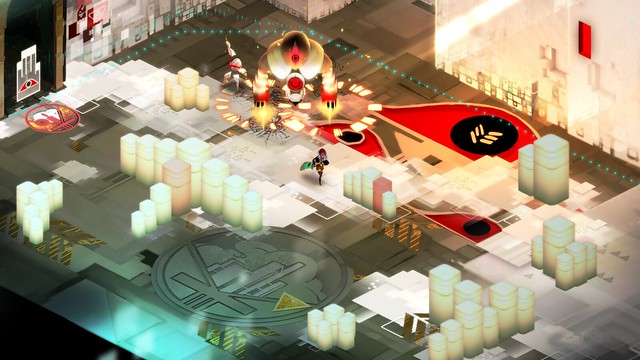
GK: I think it’s a very simple answer. They offer really unique experiences.
It’s often said that smaller developers are able to take bigger risks. I don’t see it that way. They have no choice but to take risks. They can’t compete directly – they can’t make something like Watch_Dogs. Though that’s not to say Watch_Dogs isn’t taking risks of its own.
With a small developer, when they put everything on the line that they’re passionate about – that personal expression is going to come across. It makes for very unique experiences that don’t feel like other games. It shows how much potential the broader medium has.
And they’re really wonderful games as well. When we were at EA we were playing games like Braid, and Castle Crashers, and Plants vs Zombies, that were just fantastic by any standard, big or small. And then we looked at the credits and it’s just three people. We were like “Man, we’re working in a team of 100 people and we can’t make something as good as this!” That inspired us to go and do our own thing.
And it helps that they’re inexpensive as well. You don’t have to commit $60 plus tax, or the equivalent in pound sterling, just to see if you like something.
PSB: Which titles in particular caught your eye during the E3 presentation?
GK: Man, there’s a lot of stuff I saw yesterday that looked really, really cool. I was really excited for Galak-Z, which is inspired by classic space opera, anime and stuff like that. It’s very much a game after my heart.

↕

"After our initial launch, nothing is ruled out. It's our game and our IP - the game is making its console debut on PS4 and coming to PC as well. That makes the most sense for us as a small team; it's a similar path to what we did with Bastion," Kasavin said. "For us, it's really important to not be tied down for the long haul, because Bastion's success was not made on any one platform. That being said, our focus is absolutely on a successful PS4 launch and also our Steam PC launch, because if that does not go well, there will not be other versions of the game, most likely and so forth.
"We're excited about what the PS4 is, what it represents and its potential to be a great home for a game like this. So that informed our decision and, you know, after the launch, who's to say? It's anyone's guess, but Sony has shown an incredible amount of faith in us. So in turn we plan to make it the strongest launch as we can. I think it's safe to say we're not going to be on other platforms two days after launch - or possibly ever. We simply don't know."

↕

 2 Like?
2 Like?

I remember when the seven of us at Supergiant were days away from revealing our first game, Bastion, back at PAX Prime in 2010. The game had been in development for about a year but we were only just figuring out how to talk about it to the public. When people would ask us “what is this game about,” what would we say? We weren’t sure at first, because Bastion is an action RPG where an old man talks to you the whole time — and that sounds really, really terrible. Thankfully, those who played it tended to come away with a much more positive impression. We eventually came up with stuff we could say about Bastion with a straight face, but by far our favorite way of presenting the game to people was to invite them to play it. Now here I am trying to tell you about our next game, Transistor, and I wish I could just hand you a controller and let you try it for yourself. We revealed it earlier this year at PAX East, and today we’ve announced it will be making its console debut on the PlayStation 4 when we’re finished with it sometime early next year. If you check our reveal trailer, you’ll get a feel for what Transistor is like, though let me give you a little more background.
At Supergiant our games take inspiration from many of the most memorable games we played when we were kids. In my case it’s a very long list, everything from RPGs like the classic Ultima and Final Fantasy games, to fighting games like Street Fighter II and Samurai Shodown. Those games challenged my preconceptions of what games could be, and introduced me to unforgettable worlds and characters. Rather than throw back to the classics, though, we’re much more interested in capturing the experience of playing games like that for the first time. It’s that rush you feel when you find a game that’s incredibly novel but turns out to have a lot of depth there too… the kind of game you lose yourself in, and that leaves a lasting impression long after you’re done playing.

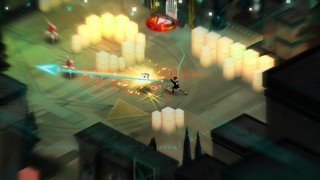

Bastion was our first attempt to act on this aspiration, and fortunately, it got a great response from around the world. It’s sold more than two million copies and earned more than 100 industry accolades, and put us in a position to maintain our independence, stick together as a team, and make something new. And, when it came to making something new, that’s exactly what we wanted. With Transistor, our aim is to create a unique-feeling game with its own strong, distinct identity, and many of its own surprises.
We’ve been working on Transistor for about a year and a half now, and most of the time has gone into finding that identity for the game. The result is a play experience that merges the kind of immediate moment-to-moment action we love with a much more deliberate and thoughtful strategic layer that lets you dictate the pace of a battle. We took inspiration from our favorite turn-based games and tactical RPGs, and aimed to capture the inherent drama and suspense of that style of play but in the context of an easy-to-learn action RPG. There’s nothing like turning the tables from the verge of defeat with some sort of spectacular last-ditch reversal, and the moment-to-moment play in Transistor should be packed with those kinds of opportunities. It’s all presented in a way that we think is unique to our game, and deeply connected to the story of this mysterious and powerful weapon you’ll be using throughout.
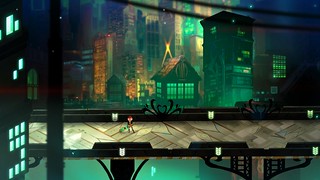
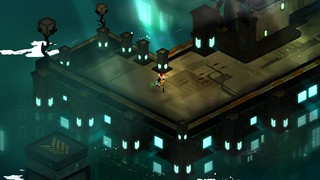
While I still sometimes struggle to find the words to describe the game I’m working on, I love talking about it almost as much as working on it, and I’d be happy to answer your questions right here in the coming days. In turn, if you want to know more about what we’re up to, please have a look at our web site or keep an eye on @SupergiantGames. In the mean time, we’ll keep doing our best to make a game that lives up to that Supergiant ideal.

